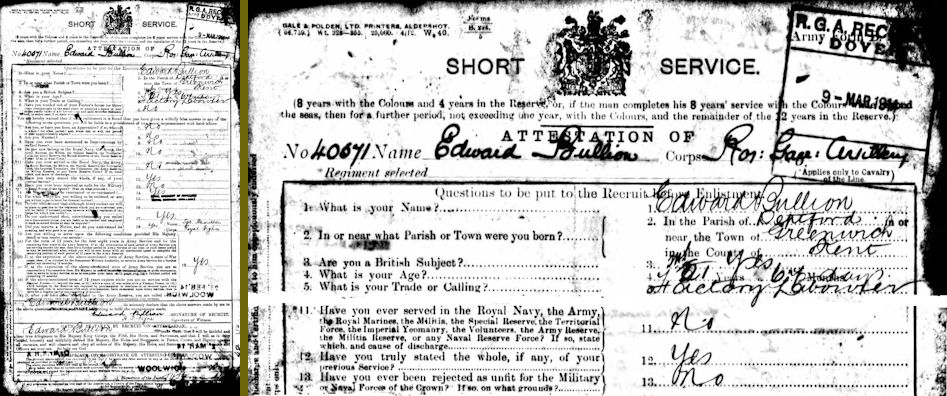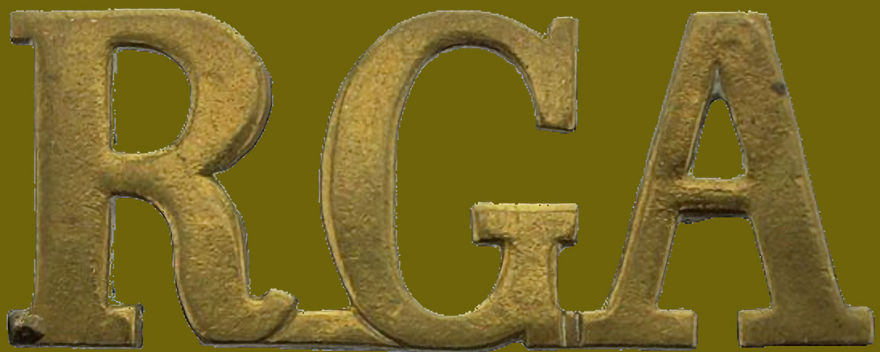Edward Victor de Bullion (1892-1959)
1904 Age: 11 years 6 months; Charge; Burglary Verdict; Guilty Sentence; Remanded, sent to an Industrial School
Friday 3 June 1904 - Kentish Mercury
BAD BOYS
"Edward Bullion, 13 (sic), of Cornbury-street, Old Kent road, and Charles Kingman, 11, of Burgos-grove, Greenwich, were charged with breaking into a warehouse at No. 113, Railway-arches, High-street, Deptford, and stealing 36 glasses belonging to Benjamin Books, of 24 Tanner's-hill, Deptford. Ambrose Price, of 85, Charles street, Deptford, stated that on Sunday afternoon, seeing the boys sorting glasses in the warehouse, he fetched a constable. Police-constable Tipton, 504 R, stated that he saw the boys in an adjoining stable and took them into custody. He had since found 36 glasses in a tip cart in the stable. The boys' fathers gave them a bad character, and Alfred Bell, Industrial Schools officer, said they had been sleeping out for several nights and kept very bad company. The Magistrate remanded them to the Camberwell Home with a view to sending them to an Industrial School."
Remanded for 7 days.
Note: Certified industrial schools provided industrial training and residential care for destitute and vagrant children, between 1857 and 1933 in England. In addition to school teachers, the staff included trade teachers who provided training in skills which would help with the children's own personal care, such as shoemaking and tailoring, as well as trade skills like printing and woodwork. Other work such as wood chopping was undertaken to produce a financial return for the school. On admission the children were, almost invariably, in a poor state of health and needed a better diet, medical care and physical exercise. The schools' regimes were not intended to be punitive but to provide a basis for their future lives. Religious instruction played an important part in the children's training and education and the provision of after-care was a primary element of the better schools. They catered mainly for children between the ages of eight and fifteen.
|
1908 Age: 15 years 4 months; Enlisted with The Royal Navy
The Royal Navy had established training centres at which recruits could be inducted into navy life. These bases accommodated volunteers aged between 15 and 17 who could spend a year being educated for future service in the navy. Boys were trained in seamanship and gunnery, as well as traditional aspects of sea life. In 1908 HMS Ganges I Training Establishment was based at Shotley on the Essex coast and was primarily a shore based establishment. This is where Edward was posted upon enlistment into the Royal Navy on 3 April 1908. It is probable that Edward's enlistment into the Royal Navy was organized by the industrial school.
Edward gave his birthday as 31 December 1891, making him almost year older than his true age. This would have meant that his service as a boy was almost a year shorter and he became an Ordinary Seaman, on higher pay, on 31 December 1909. This additional period would also count towards his naval pension. Edward left the service on 24 November 1911 after almost two years service as an Ordinary Seaman.
Having served on shore establishments and accomodation vessels in home waters his only long term posting was on HMS Flora from 1909 to 1911. In this time Flora (pictured here) sailed to many foreign places and at the time of the 1911 census was stationed off Vietnam.
Edward's period of service was, however, somewhat chequered. In early 1909 he was the accused in the Civil Power court case described below. Whilst on Flora he had four terms of imprisonment whilst on board, viz: two periods of seven days, one period of 14 days and one period of 21 days with hard labour.
Upon his return to home shores he was stationed at HMS Vivid, a shore established in Plymouth, from which he deserted on 24 November 1911 when aged almost 19. He was recovered as a deserter in 1912 but was not required for any future service, sacrificing his Royal Navy pension. Having escaped the clutches of the Royal Navy, Edward returned to South London and either started, but more probably resumed, a life of petty crime.
|
|
1909 Age: 16 years 5 months; Charge; Indecent Assault Verdict; Not Guilty
Friday 28 May 1909 - Woolwich Gazette
"Edward Bullion, 17(sic), of 120, Watergate-st, Deptford, a sailor on HMS Highflyer, stationed at Devonport, was charged with indecently assaulting John Harlick, age 12, of the same address. - P.S. Stoneham said that at 4.15 that morning prisoner, accompanied by Harlick and George Wade, come to the Deptford Police Station, when a statement was made by the lad. Prisoner, on being charged, made no reply.- Prisoner was remanded on bail".
Edward was remanded for the production of evidence for a 'serious offence' but was acquitted and discharged as shown on his Royal Navy service record and in the Sydenham, Forest Hill & Penge Gazette of Saturday 12 June 1909
The following convictions (*) were recorded in a 1931 newspaper report (see below).
1912, March Charge; Unlawful posession of some dates Verdict; *Guilty Sentence; 14 days hard labour
1912, May Charge; Stealing a pick axe Verdict; *Guilty Sentence; 6 weeks in gaol
1912, October Charge; Stealing firewood Verdict; *Guilty Sentence; 2 months in gaol
Friday 18 October 1912 - Brockley News, New Cross and Hatcham Review
"Edward Bullion, 21, stealing firewood, value 12s., entrusted to him to sell, the property of Leonard Izard, 10, Florence-cottages, New Cross. Mr. Symmons told prisoner that Izard had helped him with employment and food, and he repaid the kindness by robbing him. Two months."
1912, December Charge; Stealing a pair of trousers Verdict; *Guilty Sentence; 1 month in gaol
1913, May Charge; Stealing a bridle Verdict; *Guilty Sentence; 1 month in gaol
1913, July Charge; Stealing money Verdict; *Guilty Sentence; 3 months in gaol
1913, December Charge; Cruelly ill-treating a pony Verdict; Guilty Sentence; Fined £2 or 1 month in gaol
Thursday 11 December 1913 - Bromley Chronicle
UNFIT FOR WORK
"At the Bromley Police Court on Friday, Edward Bullion (20), a general dealer, of Carrington House, Deptford, was charged with cruelly ill-treating a pony by working it whilst in an unfit state at Sevenoaks-road, Farnborough, on Thursday. Prisoner pleaded not guilty.-P.c. Bell said the horse was in a very poor condition. On the withers, underneath the saddle, was a bad sore and the animal was lame on both fore legs.-P.s. Boyce saw the prisoner, from a window, hit the horse hard with a whip. The pony was unable to walk. Witness also saw the prisoner put some gravel underneath the saddle.--Inspr. Riley told the Magistrates that the horse was unfit for work, and ought to be destroyed. --The prisoner said the owner of the pony left him just before they got to the Police Station. Prisoner was fined 40s. and costs, or a month."
|
1914 Enlisted with The Royal Garrison Artillery

Six months before the start of World War One Edward enlisted in the British Army and joined the Royal Garrison Artillery at Great Yarmouth on 2 March 1914 as a Gunner. Although his parents were both alive Edward named his elder brother as next of kin - "George, Thames Police Wapping" - presumably because this lent greater credibility. Whether George knew about this, we cannot say.
Just like his service in the Royal Navy, Edward's period of service with the Army was undistinguished. In May 1914 he was admonished for being absent for 10½ hrs and missing a parade. In June 1916 he was confined to barracks for 5 days for overstaying his leave by 8 hours. He repeated the offence later in the month and was confined to barracks for seven days. Further absences in August resulted in two more periods of confined to barracks, one for seven days and one for ten days. For all these infractions he forfeited pay as well.
 Edward's service record shows that he was in France from September to December 1914 when the first Battle of Ypres was raging. During these few weeks he reported sick on two occasions and by 6 December 1914 he was back in the UK. For this service he was entitled to wear the 1914 Star. Edward's service record shows that he was in France from September to December 1914 when the first Battle of Ypres was raging. During these few weeks he reported sick on two occasions and by 6 December 1914 he was back in the UK. For this service he was entitled to wear the 1914 Star.
Following his return from France, on the 21 January 1915 Edward deserted again and remained on the run for 287 days until November when he was returned to the garrison and tried before a court martial for desertion. His sentence was six months imprisonment with hard labour but this was later commuted to the detention without the hard labour. All Edward's service that counted towards his pension was also forfeited. He served five months of that detention and was then released on 20 March 1916 and returned to service at Gosport. Less than a week later he was on the run again, having deserted once more.
No further entries appear on his army service record but hi Royal Navy record shows that on 27 April 1916 he was handed a form proving his service in the navy and that his character was 'fair'. It would seem that he applied for this as evidence of naval service and could be used to deflect enquiries about somebody 'with a similar name' who had deserted from the army.
|
|
1924, December Charge; Stealing a coat and a bicycle Verdict; *Guilty Sentence; 3 months and 3 months consecutively
1925, March Charge; Drunk Verdict; Guilty Sentence; Fine of 5 shillings or 5 days in gaol
1927, June Charge; Stealing wired rubber hosepipe Verdict; Not Guilty
Friday 24 June 1927 - Kent & Sussex Courier
BENEFIT OF THE DOUBT
"Edward Bullion, an engine driver for William Pettigrove, travelling showman, was summoned for stealing 30 feet of steel wired rubber hosepipe, valued at £3, at Iden Park, Staplehurst, belonging to Harry Bridgland. Ernest George Goldsmith, who said he worked for Mr. Bridgland, identified the pipe found in the possession of accused as that which he had left in a pond at Iden Park on Monday night, and which was missing on Tuesday. Sergt. H. F. Tuff stated that in the course of his enquiries he proceeded to Headcorn, where he saw the pipe attached to an engine. Defendant stated that he had bought the pipe from a man he had met on a bicycle for 2s. He denied having been near Iden Park. The Chairman said the Bench would give him the benefit of the doubt and the case would be dismissed."
1931, October Charge; Theft of a watch and cufflinks Verdict; Guilty Sentence; 6 months hard labour
Saturday 10 October 1931 - Folkestone Herald
"MOTOR DRIVER'S BAD RECORD
"Six months imprisonment for theft
"WATCH AND RINGS PAWNED
"Found guilty of stealing one silver watch and two gold rings, Edward Bullion (38)(sic), a motor-driver, of "Mackay," Bourne Road, Aldington, was sentenced to six [months] imprisonment with hard labour after two other offences had been taken into consideration at his request, at Seabrook Police Court on Monday.
"He was charged with stealing the articles, which were valued at £5 by the owner, Peter Alfred Wickham, at Aldington on September 22nd. P.C. Albert Green, of Stanford, stated that at about 9.40 p.m. on September 22nd, in consequence of a message, he proceeded to "Mackay," Aldington, where he saw Bullion. He cautioned him and told him that he had a warrant for his arrest for stealing the articles which formed the subject of the charge. He replied: "I have nothing to say." Later the same evening at Seabrook Police Station, when cautioned and charged, Bullion made the same reply.
"Wickham said Bullion and his wife had furnished rooms at his house. He described how, when he went to wind his watch on going to bed at about 9.30 on the day in question, he found the watch and also two rings missing, and indentified the articles now produced in Court as the missing articles. Bullion was supposed to be at work that night and did not return until the following day. Superintendent Golding, in reply to the Clerk (Mr. A. Dallas Brett) said that the pawn tickets had been returned in order to recover the articles.
"On the following Monday, witness continued, Bullion had returned. He handed witness three pawn-tickets, and said that he had not sold the articles, and that he was very sorry for what he had done. In the meantime, however, a warrant had been issued for his arrest. As soon as the police-constable came, witness handed the pawn-tickets over to him. In reply to Bullion, witness admitted that when he had wanted to drop the case on Bullion's return home, Bullion had asked him to send for the police. When the charge was read over to him, and he was given the choice of trial by a jury in that Court, Bullion asked to be dealt with summarily and pleaded guilty.
"A BAD RECORD.
"Superintendent Golding told the Bench that Bullion had asked that two offences he had committed at Maidstone should be taken into consideration, namely, stealing an overcoat valued £33s, in February, 1930, and stealing a lady's purse containing £9 11s. 6d. in August, 1930."
"Previous convictions proved against Bullion were as follows:
" - March, 1912, 14 days with hard labour at Thames Police Court for being in unlawful possession of some dates:
" - March, 1925, 5s. or five days at Greenwich for being drunk:
" - May, 1912, six weeks at Greenwich for stealing a pick-axe;
" - October, 1912, two months at Greenwich for stealing firewood;
" - December, 1912, one month for stealing a pair of trousers;
" - May. 1913, at Greenwich one month for stealing a bridle:
" - July, 1913. three months at Greenwich for stealing money;
" - December, 1924, three months and three months consecutively at Tower Bridge Police Court for stealing a coat and a bicycle.
"The Bench made a short retirement, after which the Chairman (Mr. C. Sheath) said that Bullion had a very bad record, and the Bench sentenced him to six months' imprisonment with hard labour."
"Bullion asked if the Bench could not give him a little leniency on account of his wife, who was about to become a mother. The Chairman said Bullion should have considered that before he committed the offence for which he had been sentenced."
|
|




